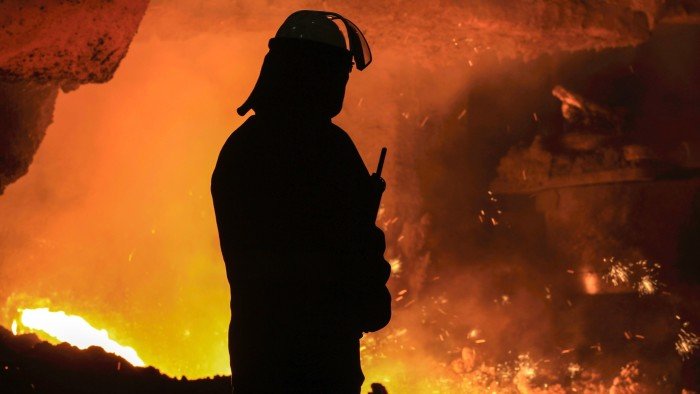Unlock the Editor’s Digest for free
Roula Khalaf, Editor of the FT, selects her favourite stories in this weekly newsletter.
The writer is a senior lecturer in economic and social history at Glasgow university. His latest book is ‘Coal Country’
The future of the UK’s last blast furnaces at Scunthorpe steelworks hangs in the balance. Closure would bring British virgin steel production — making steel from raw materials — to an end. Scunthorpe’s Chinese owners, Jingye, say that the Lincolnshire plant is unviable. President Donald Trump’s tariffs — and the world’s response — underline the fragility of global trade. These are harsh winds to which the remaining elements of the British steel industry are now exposed.
In a mark of the gravity of the situation, ministers say they are prepared to nationalise Scunthorpe, which employs 2,700 people, if necessary. Keir Starmer, don’t forget, reversed Labour’s earlier commitments to public ownership and there is little public money to spend.
But steel is the defining raw material for an industrial economy. If Britain is to realise the manufacturing potential offered by today’s push for green energy — wind turbines both onshore and offshore, equipment for solar farms, electric vehicles and battery storage all depend on steel — then it still needs to produce steel.
It may yet come down to public ownership — parliament has been recalled to hold an emergency debate this weekend on how to save Scunthorpe. But British governments on both sides of politics have been reticent on the subject for decades. Believing that privatisation will deliver superior economic performance is an article of faith and often rests on a failure to comprehend both the purpose and intent behind earlier public enterprises. This makes the UK an outlier in Europe, where the state still often owns important industries.
It’s also worth noting a paradoxical outcome of UK privatisations in the 1980s and 1990s: the entry of foreign state-owned enterprise into the British economy. The French, Irish, Danish and Norwegian governments own our wind farms. The Dutch state has run our trains. The Chinese government, through PetroChina, part-owns Grangemouth, the UK’s oldest oil refinery.
Yet nationalisation is still often viewed as an outdated, socialist ambition to control the “commanding heights” of the economy. When in 1995 Tony Blair axed the Labour party constitution’s “clause 4,” which committed it to public ownership of the means of production, distribution and exchange, it seemed to mark the end of these aims.
History reveals the pragmatic origins of many previous nationalisations — governments stepped in to address challenges that private owners could not or would not meet. After Clement Attlee’s Labour government nationalised coal, electricity and rail in the late 1940s, investment and modernisation followed. “Merry-go-round” trains, developed for the purpose, carried coal from new “superpits” to gigantic power stations.
Steel itself was the most contentious nationalisation of Attlee’s government, one that was reversed after the Conservative general election victory in 1951. At that juncture, steel was judged too profitable and too important to the regions to be run from London.
By 1967 though, this changed. Steel, then in need of profound restructuring, was taken into public ownership by Harold Wilson. Newly formed British Steel was tasked with shrinking the workforce and delivered relative success in this difficult exercise. The contracting coalfields and steelmaking regions were supported. Investing in new industries like vehicle manufacturing diversified labour markets.
Critics of public ownership argue that government control of key national industries was an important driver of British decline in this period and must not be repeated. Public enterprises are caricatured as the inflexible, centralised corporations of the mid-20th century. But they include the government’s “golden share” in BP as well as devolved public provision that includes transport and council housing. Scottish Water’s performance in investment and costs also stands up favourably when compared to privatised monopolies in England and Wales.
And the performance of the steel sector since privatisation now leaves Britain on the precipice of becoming the first major industrial economy without the capacity to make steel from scratch.
Scunthorpe’s owners since 1988 include the British-Dutch Corus partnership, the Indian Tata conglomerate, then Greybull Capital, a specialist investment group that buys troubled businesses, and, finally, Jingye. The damaging effects of being a peripheral plant in a global multinational have been on full view in recent weeks: note Jingye’s lack of interest in the government’s £500mn offer to keep Scunthorpe open.
In an economy marked by newfound uncertainty in the manufacture and supply of essential raw materials, as well as in trade, it’s no bad thing that nationalisation is now back on the table.
